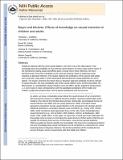| dc.contributor.author | Griffiths, Thomas L. | |
| dc.contributor.author | Sobel, David M. | |
| dc.contributor.author | Tenenbaum, Joshua B. | |
| dc.contributor.author | Gopnik, Alison | |
| dc.date.accessioned | 2015-01-12T20:09:45Z | |
| dc.date.available | 2015-01-12T20:09:45Z | |
| dc.date.issued | 2011-10 | |
| dc.date.submitted | 2011-02 | |
| dc.identifier.issn | 03640213 | |
| dc.identifier.issn | 1551-6709 | |
| dc.identifier.uri | http://hdl.handle.net/1721.1/92803 | |
| dc.description.abstract | People are adept at inferring novel causal relations, even from only a few observations. Prior knowledge about the probability of encountering causal relations of various types and the nature of the mechanisms relating causes and effects plays a crucial role in these inferences. We test a formal account of how this knowledge can be used and acquired, based on analyzing causal induction as Bayesian inference. Five studies explored the predictions of this account with adults and 4-year-olds, using tasks in which participants learned about the causal properties of a set of objects. The studies varied the two factors that our Bayesian approach predicted should be relevant to causal induction: the prior probability with which causal relations exist, and the assumption of a deterministic or a probabilistic relation between cause and effect. Adults’ judgments (Experiments 1, 2, and 4) were in close correspondence with the quantitative predictions of the model, and children’s judgments (Experiments 3 and 5) agreed qualitatively with this account. | en_US |
| dc.description.sponsorship | Mitsubishi Electronic Research Laboratories | en_US |
| dc.description.sponsorship | United States. Air Force Office of Sponsored Research | en_US |
| dc.description.sponsorship | Massachusetts Institute of Technology. Paul E. Newton Chair | en_US |
| dc.description.sponsorship | James S. McDonnell Foundation | en_US |
| dc.language.iso | en_US | |
| dc.publisher | Wiley Blackwell | en_US |
| dc.relation.isversionof | http://dx.doi.org/10.1111/j.1551-6709.2011.01203.x | en_US |
| dc.rights | Creative Commons Attribution-Noncommercial-Share Alike | en_US |
| dc.rights.uri | http://creativecommons.org/licenses/by-nc-sa/4.0/ | en_US |
| dc.source | PMC | en_US |
| dc.title | Bayes and Blickets: Effects of Knowledge on Causal Induction in Children and Adults | en_US |
| dc.type | Article | en_US |
| dc.identifier.citation | Griffiths, Thomas L., David M. Sobel, Joshua B. Tenenbaum, and Alison Gopnik. “Bayes and Blickets: Effects of Knowledge on Causal Induction in Children and Adults.” Cognitive Science 35, no. 8 (October 4, 2011): 1407–1455. | en_US |
| dc.contributor.department | Massachusetts Institute of Technology. Department of Brain and Cognitive Sciences | en_US |
| dc.contributor.mitauthor | Tenenbaum, Joshua B. | en_US |
| dc.relation.journal | Cognitive Science | en_US |
| dc.eprint.version | Author's final manuscript | en_US |
| dc.type.uri | http://purl.org/eprint/type/JournalArticle | en_US |
| eprint.status | http://purl.org/eprint/status/PeerReviewed | en_US |
| dspace.orderedauthors | Griffiths, Thomas L.; Sobel, David M.; Tenenbaum, Joshua B.; Gopnik, Alison | en_US |
| dc.identifier.orcid | https://orcid.org/0000-0002-1925-2035 | |
| mit.license | OPEN_ACCESS_POLICY | en_US |
| mit.metadata.status | Complete | |
